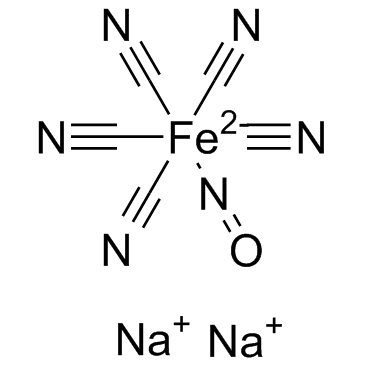14402-89-2
| 中文名 | 硝普酸钠 |
|---|---|
| 英文名 | sodium nitroprusside |
| 英文别名 | Nitroprusside (Sodium) |
| 描述 | Sodium Nitroprusside是血管舒张剂,能促使NO释放于血液中。 |
|---|---|
| 相关类别 | |
| 参考文献 |
| 密度 | 1.72 |
|---|---|
| 分子式 | C5FeN6Na2O |
| 分子量 | 261.91800 |
| 精确质量 | 261.92800 |
| PSA | 148.38000 |
| LogP | 0.29850 |
| 外观性状 | Liquid | Clear tan-gold |
| 储存条件 | 室温 |
Synonym:Disodium nitrosylpentacyanoferrate; nipride; nitroprussidnatrium;sodium nitroprussat Section 2 - COMPOSITION, INFORMATION ON INGREDIENTS
Risk Phrases: 28 36 Section 3 - HAZARDS IDENTIFICATION EMERGENCY OVERVIEW
Very toxic if swallowed. Irritating to eyes.Toxic. Potential Health Effects Eye: May cause eye irritation. Skin: May cause skin irritation. Ingestion: Harmful if swallowed. May cause irritation of the digestive tract. The toxicological properties of this substance have not been fully investigated. Inhalation: Dust is irritating to the respiratory tract. May cause cardiac abnormalities. Chronic: No information found. Section 4 - FIRST AID MEASURES Eyes: Flush eyes with plenty of water for at least 15 minutes, occasionally lifting the upper and lower lids. Get medical aid. Skin: Flush skin with plenty of soap and water for at least 15 minutes while removing contaminated clothing and shoes. Get medical aid if irritation develops or persists. Ingestion: If victim is conscious and alert, give 2-4 cupfuls of milk or water. Get medical aid immediately. Inhalation: Get medical aid immediately. Remove from exposure to fresh air immediately. If not breathing, give artificial respiration. If breathing is difficult, give oxygen. Notes to Physician: None Antidote: None reported Section 5 - FIRE FIGHTING MEASURES General Information: As in any fire, wear a self-contained breathing apparatus in pressure-demand, MSHA/NIOSH (approved or equivalent), and full protective gear. Extinguishing Media: For small fires, use dry chemical, carbon dioxide, water spray or alcohol-resistant foam. Autoignition Temperature: Not applicable. Flash Point: Not applicable. NFPA Rating: Not published. Explosion Limits, Lower: Not available. Upper: Not available. Section 6 - ACCIDENTAL RELEASE MEASURES General Information: Use proper personal protective equipment as indicated in Section 8. Spills/Leaks: Sweep up, then place into a suitable container for disposal. Avoid generating dusty conditions. Section 7 - HANDLING and STORAGE Handling: Wash thoroughly after handling. Wash hands before eating. Use only in a well ventilated area. Minimize dust generation and accumulation. Avoid ingestion and inhalation. Storage: Store in a cool, dry place. Section 8 - EXPOSURE CONTROLS, PERSONAL PROTECTION Engineering Controls: Use adequate general or local exhaust ventilation to keep airborne concentrations below the permissible exposure limits. Personal Protective Equipment Eyes: Wear appropriate protective eyeglasses or chemical safety goggles as described by OSHA's eye and face protection regulations in 29 CFR 1910.133. Skin: Wear appropriate gloves to prevent skin exposure. Clothing: Wear appropriate protective clothing to minimize contact with skin. Respirators: Follow the OSHA respirator regulations found in 29CFR 1910.134. Always use a NIOSH-approved respirator when necessary. Section 9 - PHYSICAL AND CHEMICAL PROPERTIES Physical State: Solid Appearance: clear dark red Odor: Not available. pH: Not available. Vapor Pressure: Not applicable. Vapor Density: Not available. Evaporation Rate: Not applicable. Viscosity: Not applicable. Boiling Point: Not available. Freezing/Melting Point: Not available. Decomposition Temperature: Not available. Solubility: 40% @ 20 C Specific Gravity/Density: 1.72 Molecular Formula: C5FeN6Na2O Molecular Weight: 261.8662 Section 10 - STABILITY AND REACTIVITY Chemical Stability: Stable under normal temperatures and pressures. Conditions to Avoid: Dust generation. Incompatibilities with Other Materials: Strong oxidizing agents. Hazardous Decomposition Products: Nitrogen oxides, carbon monoxide, carbon dioxide, toxic fumes of sodium oxide. Hazardous Polymerization: Has not been reported. Section 11 - TOXICOLOGICAL INFORMATION RTECS#: CAS# 14402-89-2: LJ8750000 LD50/LC50: CAS# 14402-89-2: Oral, mouse: LD50 = 61 mg/kg; Oral, rabbit: LD50 = 34 mg/kg; Oral, rat: LD50 = 99 mg/kg. Carcinogenicity: Sodium nitroprusside - Not listed by ACGIH, IARC, NIOSH, NTP, or OSHA. Other: See actual entry in RTECS for complete information. Section 12 - ECOLOGICAL INFORMATION For further information, contact Fisher Scientific. Section 13 - DISPOSAL CONSIDERATIONS Dispose of in a manner consistent with federal, state, and local regulations. Section 14 - TRANSPORT INFORMATION CDG/CPL Shipping Name: TOXIC SOLID, INORGANIC, NOS (Sodium nitroprusside) Hazard Class: 6.1 UN Number: 3288 Packing Group: II IMO No information available. IATA No information available. RID/ADR No information available. Canadian TDG Shipping Name: POISONOUS SOLIDS NOS (SODIUM NITROPRUSSIDE) Hazard Class: 6.1(9.2) UN Number: UN2811 Section 15 - REGULATORY INFORMATION European/International Regulations European Labeling in Accordance with EC Directives Hazard Symbols: T+ Risk Phrases: R 28 Very toxic if swallowed. R 36 Irritating to eyes. Safety Phrases: S 26 In case of contact with eyes, rinse immediately with plenty of water and seek medical advice. S 45 In case of accident of if you feel unwell, seek medical advice immediately (show the label where possible). WGK (Water Danger/Protection) CAS# 14402-89-2: Canada CAS# 14402-89-2 is listed on Canada's DSL/NDSL List. This product has a WHMIS classification of D1B, D2B. CAS# 14402-89-2 is not listed on Canada's Ingredient Disclosure List. Exposure Limits US FEDERAL TSCA CAS# 14402-89-2 is listed on the TSCA inventory. SECTION 16 - ADDITIONAL INFORMATION N/A |
CHEMICAL IDENTIFICATION
HEALTH HAZARD DATAACUTE TOXICITY DATA
|
| 危害码 (欧洲) | T: Toxic; |
|---|---|
| 风险声明 (欧洲) | 25 |
| 安全声明 (欧洲) | 45 |
| 危险品运输编码 | UN 3288 6.1/PG 3 |
| WGK德国 | 3 |
| RTECS号 | LJ8925000 |
| 包装等级 | III |
| 危险类别 | 6.1(b) |


